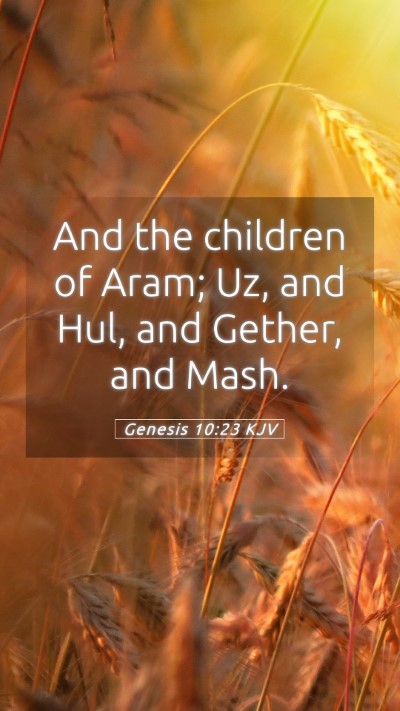Understanding Genesis 10:23
Genesis 10:23 states: "And the children of Aram; Uz, and Hul, and Gether, and Mash." This verse is part of a genealogical account that details the descendants of Noah after the flood. In this summary, we delve into the meaning of the Bible verse, providing insights from various public domain commentaries.
Contextual Overview
The context of Genesis 10 is crucial for a proper Bible verse explanation. This chapter documents the descendants of Noah’s sons: Shem, Ham, and Japheth. The genealogies serve not only historical purposes but also theological ones, illustrating God’s covenantal promises and the spread of nations throughout the earth after the flood.
Insights from Commentaries
Matthew Henry's Commentary:
-
Genealogy as a Reflection of Providence: Henry emphasizes the divine providence reflected in genealogies, indicating how God preserves lineages to fulfill His promises.
-
Significance of these Names: The names listed, while seemingly insignificant, hold importance for understanding the dispersal of people and cultures post-flood.
Albert Barnes' Notes:
-
Historical Relevance: Barnes points out that Uz, often associated with the region of Edom, signals the establishment of nations and ethnicities we recognize in later historical accounts.
-
Biblical Locations: The mention of Aram connects to the ancient Aramean people, highlighting the geographical spread post-Babel.
Adam Clarke's Commentary:
-
Cultural Implications: Clarke posits that the names listed should be viewed through the lens of cultural and linguistic development of the nations.
-
Typological Connections: He suggests that these names may foreshadow later biblical events and characters, enriching scripture analysis.
Thematic Analysis
The overarching theme of Genesis 10 is the notion of Bible verse understanding through the lens of divine providence and the establishment of nations. The genealogies illustrate God's plan for humanity, mapping out the future of various peoples and cultures.
Lessons for Today
Readers can apply the insights gained from Genesis 10:23 by understanding the significance of ancestry and heritage in God’s unfolding plan. Knowing the origins of nations can lead to deeper appreciation and recognition of God's work through history.
Cross References
- Genesis 10:2-5: Discusses the descendants of Japheth and their territories.
- Genesis 11:1-9: The Tower of Babel and the dispersion of peoples.
- Job 1:1: Reference to Uz, highlighting biblical locations connected to genealogies.
- 1 Chronicles 1:17-23: Lists the sons of Shem and relevant genealogical connections.
- Deuteronomy 2:20-23: Discusses the origins of the nations descended from Lot, highlighting ethnic and national boundaries.
Conclusion
In summary, Genesis 10:23 serves as a vital link in the greater narrative of Scripture, emphasizing God’s sovereignty in establishing nations and preserving lineages that are foundational to the biblical story. Understanding this Bible verse interpretation connects readers with the larger themes of God's plan for humanity. For further insights, engage with Bible study tools and Bible study groups for collaborative learning and exploration of this verse and its context.


